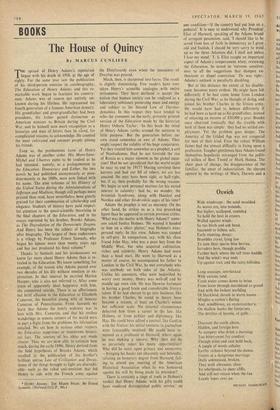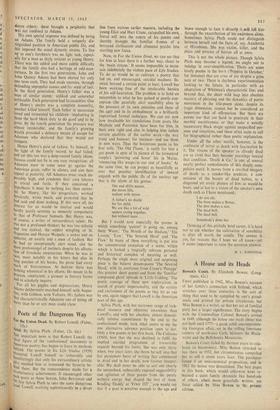BOOKS The House of Quincy
By MARCUS CUNLIFFE
HE spread of Henry Adams's reputation I began with his death in 1918, at the age of eighty. For the same year saw the publication
of his third-person exercise in autobiography,
The Education of Henry Adams; and this re- markable work began to fascinate his country-
men. Adams was of course not entirely un- known during his lifetime. He represented the fourth generation of a famous American dynasty.
His grandfather and great-grandfather had, been presidents, his father gained distinction as American minister to Britain during the Civil - War, and he himself won more recognition as a historian and man of letters than he cared, for complicated reasons, to acknowledge. He counted the most cultivated and eminent people among his friends.
Even so, the posthumous fame of Henry Adams was of another order. His Mont-Saint- Michel and Chartres came to be studied as he had intended: namely, as a prolegomenon to the Education. Democracy and Esther, the two novels he had published anonymously or pseu- donymously in the 1880s, were now linked with his name. The nine volumes of his History of the United States during the Administrations of Jefferson and Madison, though still perhaps more praised than read, have nevertheless been greatly praised for their combination of scholarship and elegance. Students of history have paid respect- ful attention to the quasi-scientific theorising in the final chapters of the Education, and in the essays reprinted by his brother, Brooks Adams, as The Degradation of the Democratic Dogma. And Henry has been the subject of biography after biography. The largest of these endeavours is a trilogy by Professor Ernest Samuels, who began his labour more than twenty years ago and has just produced his final volume.* Thanks to Samuels and his predecessors we know far more about Henry Adams than is re- vealed in the Education. We know something, for example, of the reason why Adams passed over two decades of his life without mention or ex- planation. In that interval he married Marian Hooper, who is also not referred to. After some years of apparently ideal happiness with him, she committed suicide. There is an affectionate but brief allusion in the Education to Elizabeth Cameron, the beautiful young wife of Senator Cameron of Pennsylvania. From Samuels we learn that Adams the lonely widower was in love with Mrs. Cameron, and that his restless wanderings in remote corners of the world were • in part a flight from the problems his infatuation entailed. We see how in various other respects the Education suppresses or transforms histori- cal fact. The sources of his ideas are made clearer. Thus we arc now able to estimate how much, during the early 1890s, Henry derived from -the bold hypotheses of Brooks Adams, which resulted in the publication of his brother's brilliant untrue Law of Civilisation and Decay. Some of the things brought to light are discredit- able—such as the rabid anti-semitism that led Henry to side with the French army against * HENRY ADAMS: THE MAJOR PHASE. By 'Ernest Samuels. (Haivard/O.U.P., 80s.)
the Dreyfusards even when the innocence of Dreyfus was proved.
Much, then, is sharpened into focus. The result is slightly diminishing. Few readers have ever taken Henry's scientific analogies with entire seriousness. They have declined to accept the notion that human society can be analysed as a laboratory substance possessing mass and energy and subject to the Second Law of Thermo- dynamics. In this respect they have tended to echo the comment on the early, privately printed version of the Education made by the historian Henry Osborn Taylor: 'In this book the mind of Henry Adams rattles around the universe to little purpose.' But the generation before our own stood somewhat in awe of Adams. They might suspect the validity of his huge conjectures. Yet they treated him somewhat as a prophet, a sort of Nostradamus. Had he not foretold the rise of Russia as a major element in the global equa- tion? Had he not speculated that the world might be near its end by 1917? 'Having survived these horrors and had our fill of others, we are less amazed. He may have been right, or half-right, but if so, then probably for the wrong reasons. We begin to seek personal motives for his vested interest in calamity: had he, we wonder, the Jeremiah Syndrome, along with Haeckel and Nordau and other fin-de-siecle sage; of his time? Adams the prophet is not so uncanny. On the other hand, he strikes us as a less provoking figure than he appeared to certain previous critics. 'What was the matter with Henry Adams?' some- one asked Justice Holmes. 'He wanted it handed to him on a silver platter,' was Holmes's exas- perated reply. In this view, Adams was steeped in self-pity. In comparison, say, with his close friend John Hay, who was a poor boy from the Middle West, but who acquired cultivation, riches and celebrity, Henry Adams had more than a head start. He went to Harvard as a matter of course, he accompanied his father to London in the Civil War, he met everybody who was anybody on both sides of the Atlantic. Unlike his ancestors, who were bedevilled by worry over money, Henry was well-off and by middle age even rich. He was likewise fortunate in having a good brain and considerable literary talent. If he had chosen to go into business, like his brother Charles, he could in theory have become a tycoon, at least on Charles's minor but sufficient scale. No external circumstance debarred him from a career in the law, like Holmes, or from politics and diplomacy, like Hay. He could have edited a journal, like Godk in with the Nation; his initial ventures in journalism were favourably received. He could have re-
mained as a professor at Harvard. where again he was making a success. Why then did he so perversely reject his many opportunities?
Why did he insist upon privacy and anonymity —bringing his books out obscurely and belatedly, refusing an honorary degree from Harvard, fail- ing to attend any meeting of the American Historical Association when he was honoured against his will by being made its president?
There is certainly a tinge of truth in Holmes's verdict that Henry Adams 'with his gifts could have rendered distinguished public service.' on
one condition—'if the country had put him on a , pedestal.' It is easy to understand why President Eliot of Harvard, speaking of the Adams brand of arrogant pessimism, said, 'I should like to be saved from loss of faith in democracy as I grow old and foolish. I should be very sorry to wind up as the three Adamses did. I shall not unless I lose my mind.' T. S. Eliot caught an important aspect of Adams's temperament when, reviewing the Education, he noted its 'extreme sensitive- ness to all the suggestions that dampen en- thusiasm or dispel conviction.' He was right: Adams's outlook is peculiarly disabling.
But at this distance the extent at his disable- ment becomes more evident. He might have felt differently if he had come home from London during the Civil War, as he thought of doing, and joined his brother Charles in the Union army. He would have had to behave differently if he had been as hard up as his grandfather, instead of enjoying an income of $50,000 a year. Brooks once observed ironically that the trouble with both of them was simple: they had no settled em- ployment. Yet the problem goes deeper. The America of the Gilded Age was not congenial for men of their kind. Even the robust William James had the utmost difficulty in fixing upon a profession. Tougher gentlemen than Adams found themselves hopelessly estranged from the politi- cal milieu of Boss Tweed or Mark Hanna. The sheer pace of change, the disappearance of the familiar, the onset of industrialism. the abysses opened by the writings of Marx, Darwin and a dOzen others: these brought a perplexity that Was not confined to Adams.
His own special response was defined by being an Adams. The family held a uniquely dis- tinguished position in American public life, and this imposed the usual dynastic strains. To live up to one's forebears was no light task, especi- ally for a man as shyly reticent as young Henry. There was the added and more subtle difficulty that the family also had a heritage of odd-man- outness. In the first two generations, John and John Quincy Adams had been elected for only one term each. They had made enemies, through defending unpopular causes and for want of tact. In the third generation, Henry's father was a man of similar stamp: unliked and somewhat unlikeable. Each generation had its casualties. One of Henry's uncles was a complete nonentity, another killed himself. Each father in succession loved and tormented his children—implanting in them the hard bleak duty to do good and to be great. By the fourth generation the pressure was almost intolerable; and the family's growing Wealth provided a delusory means of escape for Adamses who declared that they would not Compete.
Hence Henry's pose of failure. Tc himself, in the light of the family record, he had failed; and yet this too was a deep-rooted family idiom. Success could not lie in any easy recognition; all Adamses must in some sense go against the American grain, suffer in silence, and aim their appeal at posterity. All Adamses must reach im- possibly high, and condemn their own labours as trivial and futile. If they conceived a hypothesis it must be nothing less than univer- sal. So Henry, like his progenitors, worked heroically, wrote much, and protested that he had said and done nothing. If this were all, his interest for us would be limited and would hardly justify scrutiny as minutely sympathetic• as that of Professor Samuels. But Henry was, of course, a writer of extraordinary talent. He Was not a profound thinker; he was too eclectic and too cynical, the oddest mingling of St. Augustine and Horace Walpole, a seeker and an aphorist, an ascetic and a man of fashion. But he had an exceptionally alert mind, and the most professinal of instincts despite his affecta- tion of frivolous amateurism. When he was at ease, most notably in his letters but also in long patches of his books, his prose had every Nark of first-rateness. At bottom there was nothing whimsical in his efforts. He meant to be protean, omniscient, a pioneer in literary forms and in scholarly inquiry. For all his giggles and deprecations, Henry Adams deliberately matched himself with Augus- tine, with Gibbon, with Voltaire. His failure was that characteristically Adamsite one of biting off more than he or any man could chew.



































 Previous page
Previous page